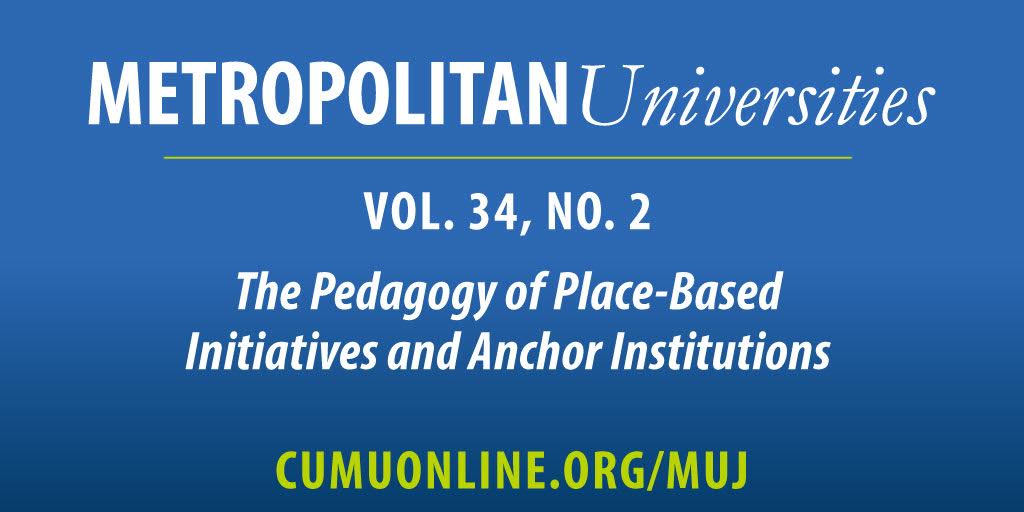Elevating Community Voices through Place-Based Education Initiatives in Chicago
DOI:
https://doi.org/10.18060/26444Keywords:
place-based learning, community engagement, internships, community voices, ChicagoAbstract
The Chicago Center for Urban Life and Culture is a non-profit organization that has been developing place-based education models since it was established in 1970. Situated in an urban environment, the Chicago Center operates at the intersection of higher education and place-based education with a pedagogical approach that centers and elevates community voices. Place-based education initiatives provide students with educational opportunities that emphasize active, experiential learning by immersing the participant in local, communities. The Chicago Center enriches place-based education by using a first-person instructional approach—First Voice Pedagogy—to expand the traditional classroom and link liberal arts education to applied learning through exposure to community-based leaders and organizations. This paper proposes a paradigm shift in place-based education and serves as an encouraging model for establishing more inclusive place-based initiatives.
References
Bringle, R. G., & Hatcher, J. A. (1996). Implementing service learning in higher education. Journal of Higher Education, 67(2), 221-239.
Butler, A., & Sinclair, K. A. (2020). Place Matters: A Critical Review of Place Inquiry and Spatial Methods in Education Research. Review of Research in Education, 44(1), 64-96.
Center for Place-Based Education ' Antioch University. Antioch University ' Win One For Humanity. (n.d.). Retrieved July 31, 2022, from https://www.antioch.edu/centers-institutes/center-place-based-education.
Chickering, A. W., & Reisser, L. (1994). Education and Identity. Hoboken, NJ: Wiley Press.
Dewey, J. (1938). Experience and education. New York, NY: Touchstone Books.
Friere, P. (1984). The Pedagogy of the Oppressed. New York, NY: Continuum International Publishing Group.
Gruenewald, D. A., & Smith, G. A. (2008). Place-Based Education in the Global Age. London, UK: Routledge Books.
Gruenewald, D. (2003a). The best of both worlds: A critical pedagogy of place. Educational Researcher, 32(4), 3–12. https://doi.org/10.3102/0013189X032004003
Gruenewald, D. (2003b). Foundations of place: A multidisciplinary framework for place conscious education. American Educational Research Journal. 40(3), 619–654. https://doi.org/10.3102/00028312040003619
Hague, E. (2020). Connecting Courses, Curriculum, and Community in Chicago. Metropolitan Universities, 31(2), 7-17 DOI: 10.18060/23923
Kolb, D.A. (1984). Experiential Learning: Experience as a Source for Learning and Development. Englewood Cliffs, NJ: Prentice Hall.
Powers, A. L. (2004). An Evaluation of Four Place-Based Education Programs. The Journal of Environmental Education, 35(4).
Langran, E. & DeWitt, J. (2020). Navigating Place-Based Learning: Mapping for a Better World. London, UK: Palgrave Macmillan.
Lau, K.H., Chan, M.Y.L., Yeung, C.L.S., Snell, R.S. (2021). An Exploratory Study of the Community Impacts of Service-Learning. Metropolitan Universities, 32(2), 106-128. DOI: 10.18060/25482
Place-based Education Evaluation Collaborative. 2010. Benefits of Place-based Education: A Report from the Place-based Education Evaluation Collaborative (Second Edition). Retrieved July 25, 2022 from http://tinyurl.com/PEECBrochure.
Sobol, D. (2004). Place-Based Education: Connection Classrooms and Communities. Great Barrington, MA: Orion Publishing.
Smith, G. A. (2002). Place-based education: Learning to be where we are. Phi Delta Kappan, 83(8), 584–594.
Vander Ark, T., Liebtag, E., & McClennen, N. (2020). The Power of Place: Authentic Learning Through Place-Based Education. Alexandria, VA: ASCD.
Downloads
Published
Issue
Section
License
Copyright (c) 2023 Tyler Hough

This work is licensed under a Creative Commons Attribution 4.0 International License.



